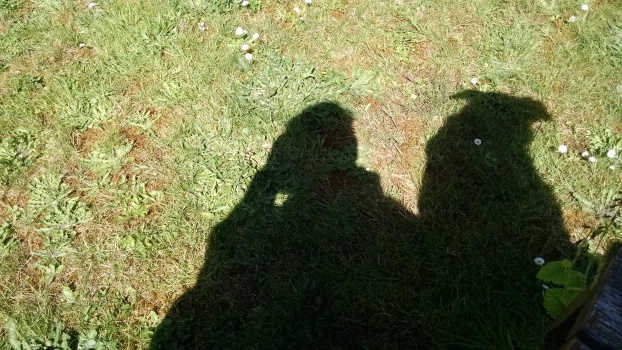Click here to provide a musical accompaniment to today’s post. Your choices are “Keep the Radio On” by The Lonely Boys and “Listen to the Radio by Kathy Mattea. Listen to both. Why not?
I never used to listen to the radio while I worked. I preferred to allow my thoughts to run free in the silence, to deal only with the messages received by my own five senses. Not anymore. Not since 9/11, when I discovered that my grad school was closed due to the “national tragedy” and I didn’t know what the tragedy was. I turned on the television and saw planes crashing, smoke billowing, people running, crying, bleeding.
Day after day, I sat with the radio or television on, watching firefighters digging in the rubble for their comrades, hoping the missing people would somehow be found alive. I wept through the memorial services and listened to President Bush promise that we would stamp out the evildoers. I watched videotape of Afghani teenagers training for war and President Bush’s “shock and awe” attack on Iraq. It was awful, but I was afraid to look away. Who knew where the terrorists might attack next?
In 1963, when President Kennedy was assassinated, my brother and I were home sick with chicken pox. Walter Cronkite interrupted our television show to tell us the president had been shot. Like most Americans, our family sat in front of the television the entire weekend. After the funeral, when it was all over, we turned the television off reluctantly, afraid something else would happen when we weren’t looking.
And it did. A few years later, I listened to the radio late at night as Sen. Robert Kennedy celebrated his victory in the California presidential primary. I fell asleep happy, not knowing that minutes after I pushed the off button, Robert Kennedy would be killed.
One day in 1986, while I was buying stamps at the Post Office, people seemed to be talking about some major event.
“What’s going on?” I asked the clerk.
“The space shuttle blew up.” He pointed to a TV screen behind him. We paused mid-transaction to watch videotape of the Challenger exploding in mid-air.
Three years later, during the Loma Prieta earthquake that devastated the Bay Area, I was doing research at the San Jose library. The first thing I did when I got to my car was turn on the radio. The Bay Bridge had collapsed. The World Series game between the Giants and the A’s had been canceled. The quake was worse than I thought.
Lately, we have seen terrorist attacks in London, Manchester, Orlando, Paris and other places. Men were stabbed on a Portland train for defending two women against anti-Muslim epithets. A few days ago, a gunman opened fire at a Republican senators’ baseball practice. It keeps happening. It’s online, on the screen and on the air. Sometimes it seems the media makes too much of things. Everything is “breaking news,” and the talking heads say the same things and play the same video clips repeatedly, but we watch, mesmerized.
In this volatile world of mass attacks and Trumpmania, I’m hooked up to Facebook, CNN and NPR all day long, afraid I’ll miss something. Even at the beach or in the woods, I can check the headlines on my cell phone. If something happens, I will not be taken by surprise as I was on 9/11. Maybe it’s partly my years as a newspaper reporter, but I need to know what’s going on.
Perhaps it’s genetic. My mother always had the radio on. Growing up, she listened to news of the attack on Pearl Harbor, to President Roosevelt’s fireside chats, and to reports of Roosevelt’s death. She also listened to baseball games, soap operas and the Arthur Godfrey show. The radio murmuring in the background kept her connected to the national consciousness while she baked cookies and ironed clothes. If anything happened, she would know.
Now when I pass a television, I can’t resist clicking on CNN to see what’s happening. The browser on my computer opens to the news. All of my radios are set on NPR.
It’s hard to write with the media on. The voices are distracting. Some of the music and all of the commercials irritate me. Why don’t I just turn it off? If I had no radio, TV or Internet, I wouldn’t be upset by distant events. I could just worry about whether the wind will knock down the aging spruce at the corner of my yard or whether the rain will turn to snow. On a sunny day, I could walk my dog on the beach with no idea of anything bad happening somewhere else.
When I hear about upsetting events, I am pulled into the national sadness. I have not personally lost anything. I’m still eating meat loaf for dinner and watching “The Bachelorette” at 8:00. But I fear that the day I turn my back will be the day events from far away suddenly roll over me like a sneaker wave and pull me out to sea.
So I turn on the news. Just in case. In fact, I think the president’s press secretary is speaking now. Gotta go.
“We’ve All Become Addicted to the Drug of News” Writer Chris Moss talks about why we’re so addicted to something that doesn’t do us much good at all. Like booze or computer games.
In “Overcoming News Addiction,” Steve Palina says the news is depressing, slanted, shallow, and wastes our time, so why are we still checking the news? How would it feel to go cold-turkey?
How about you? Are you hooked on news or do you avoid it? Whom do you trust to tell the truth? How does it affect you to hear about disasters happening elsewhere? Why watch?
